Growing vegetables at Dal Lake in Srinagar, Kashmir, and selling them in houseboats is a feast for the eye.
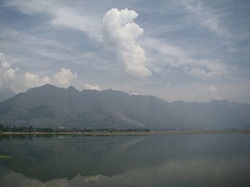
Pir Panjal mountains overlooking Dal lake
The Indian state of Kashmir is known for its charming beauty. It is surrounded by three mountain ranges of the Himalayas- Karakoram, Zanaskar and Pir Panjal, running from northwest to northeast.
Srinagar, the summer capital of Kashmir (Jammu is the winter capital) and the “Venice of the Orient”, is built around Dal Lake. The sparkling quiet waters of Dal surrounded by snow-capped mountains on its three sides, undoubtedly mark it as one of the most beautiful lakes of India. It is also the second largest lake in the state of Jammu and Kashmir with numerous gardens and orchards all along its shores.
Srinagar, the summer capital of Kashmir (Jammu is the winter capital) and the “Venice of the Orient”, is built around Dal Lake. The sparkling quiet waters of Dal surrounded by snow-capped mountains on its three sides, undoubtedly mark it as one of the most beautiful lakes of India. It is also the second largest lake in the state of Jammu and Kashmir with numerous gardens and orchards all along its shores.
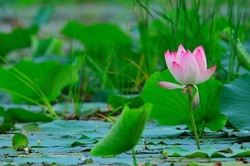
Lotus flowers at dal lake
The lake covers 18 square kilometers, and is divided by causeways into four basins, called Gagribal, Lokut Dal, Bod Dal and Nagin.
Clusters of green vegetation gently floating on the surface and the undulating pink and white lotus flowers add charm to the environs, while beautiful white breasted kingfishers greet you cheerfully amidst the prayer calls from the lakeside Hazratbal Mosque.
Clusters of green vegetation gently floating on the surface and the undulating pink and white lotus flowers add charm to the environs, while beautiful white breasted kingfishers greet you cheerfully amidst the prayer calls from the lakeside Hazratbal Mosque.
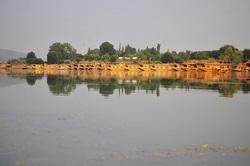
Hotels, Mughal era gardens such as Shalimar Bagh and Nishat Bagh built during the reign of Mughal Emperor Jahangir, and hundreds of Victorian-era wooden houseboats, originally built as vacation homes for landless British administrators during the Raj, dot its shore.
Each houseboat usually has 2-5 bedrooms plus bath, dining room, living room and an upper deck.
Each houseboat usually has 2-5 bedrooms plus bath, dining room, living room and an upper deck.
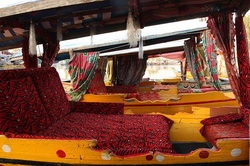
Colorful shikaras or boats cruise the lake that reflect the the misty peaks of the Pir Panjal mountains, transporting goods to market, children to school and travelers to and from the shore.
The Dal Lake is also famous for its 'floating markets', the only one of its kind in India, and quite like the rowing shops in the Mekong Delta in Vietnam or Damnoen Saduak Floating Market at Bangkok.
The 'floating vegetable market' is a very old market where vegetables grown and retrieved from the lake is sold between 5 am and to 7 am everyday and any vegetables left over are taken to street markets.
Tourists can hire shikaras for tours around the lake, visit floating gardens and the floating flower and the vegetable market.
Read More
The Dal Lake is also famous for its 'floating markets', the only one of its kind in India, and quite like the rowing shops in the Mekong Delta in Vietnam or Damnoen Saduak Floating Market at Bangkok.
The 'floating vegetable market' is a very old market where vegetables grown and retrieved from the lake is sold between 5 am and to 7 am everyday and any vegetables left over are taken to street markets.
Tourists can hire shikaras for tours around the lake, visit floating gardens and the floating flower and the vegetable market.
Read More
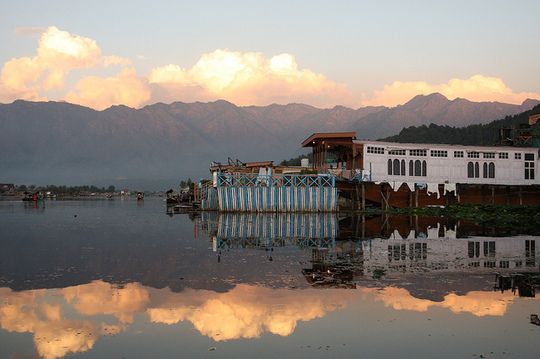
 RSS Feed
RSS Feed